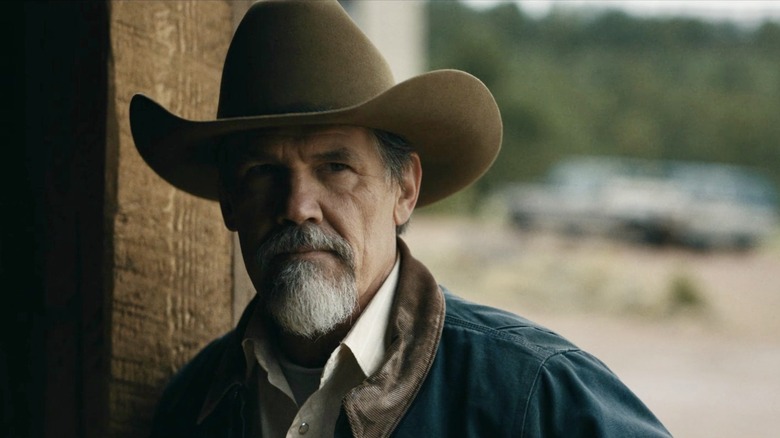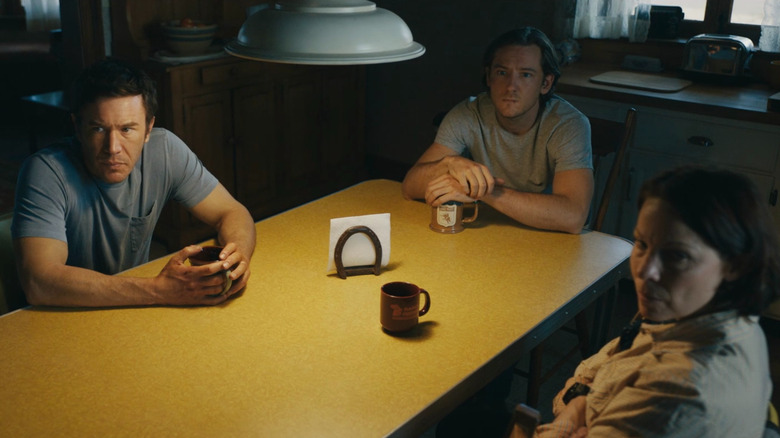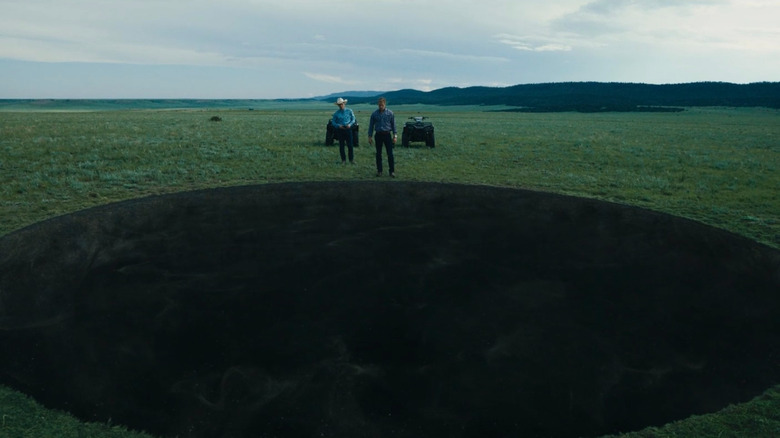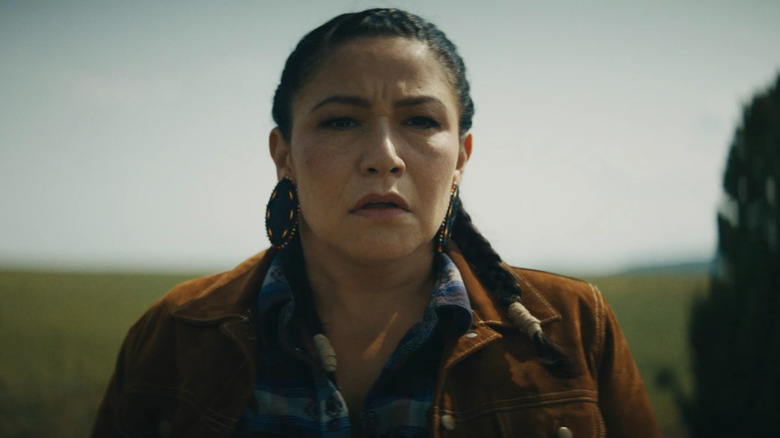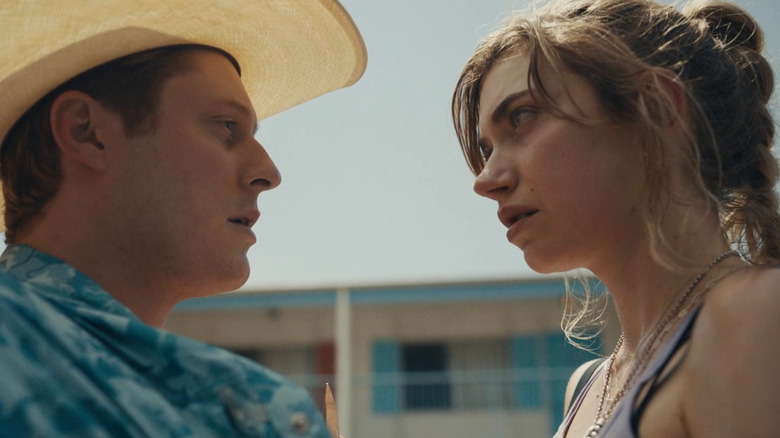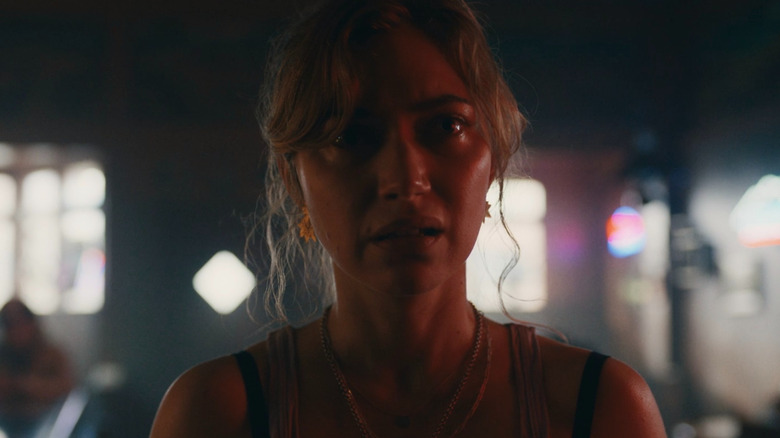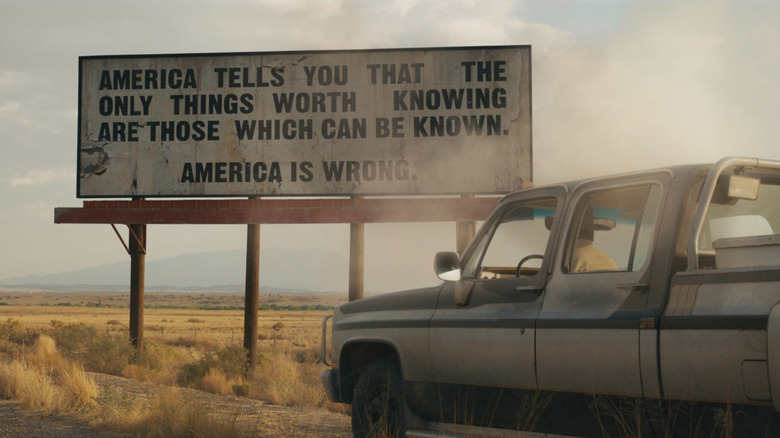Outer Range Spoiler Review: A Sci-Fi Western Carried By Josh Brolin And A Workhorse Cast
Prime Video's "Outer Range," starring Josh Brolin, is one of several new mystery-box shows that have premiered in recent months, with Showtime's "Yellowjackets," Apple's "Severance," and Epix's "From" being other examples. The original idea behind the mystery box, a term "Lost" co-creator J.J. Abrams popularized in a TED Talk, was that it "represents infinite possibility" and is best left unopened to tease the imagination.
"Outer Range" reimagines the box as a mystery hole-in-the-ground on the back pasture of a ranch owned by Brolin's character, Royal Abbott, and his family. Imagine if Llewelyn Moss, Brolin's taciturn Texas pronghorn hunter from "No Country for Old Men," had moved to Wyoming, taken to herding cattle, and raised two sons with his wife. Now, imagine that some of the Lynchian weirdness of "Twin Peaks" had simultaneously uprooted from Washington state to Royal's town.
"Outer Range" opens with the line, "You know anything about a Greek god called Chronos?" Royal speaks in voiceover of said god opening a "tear in the cosmos" with his sickle, "to separate the known from the unknown." Yet viewers may also remember the myth of Tantalus (the etymology for the word "tantalizing") and the food and water left forever out of reach for him when they watch shows like "Outer Range." These shows thrive on enigmatic questions, but it can sometimes backfire on them when it becomes clear to the audience that the mystery box is filled with air, merely a decorative fake gift that suckers the viewer in and strings them along with intrigue while a whole lot of character drama or melodrama unfolds.
"Outer Range" may still test the patience of some viewers like that, but what separates this series from some failed mystery-box shows of yore is its above-average cast, which helps give the drama and sci-fi Western a more cinematic quality than what you might see on network television. The series may have also benefitted from its release strategy of two episodes by a new director each week, enabling the viewer to get engrossed and receive a quicker payoff to certain mysteries, even as other questions are introduced but predictably left unresolved by the season's end.
Saddle up and let's discuss the known and unknown with full spoilers for "Outer Range."
Meet the Abbotts
In "Outer Range," Brolin is just the tip of the iceberg for a strong ensemble that has helped the show get by since its premiere four weeks ago. Showrunner Brian Watkins leads the writers' room, and he has assembled a cast that includes breakout performers like Tamara Podemski, who holds First Nations ancestry, along with other familiar character actors like Will Patton. The always-reliable Lili Taylor ("The Addiction") plays Royal's devout wife, Cecilia, and Tom Pelphrey and Lewis Pullman play his sons, Perry and Rhett.
Perry is broken and slightly unstable, as if reincarnated in mellower form from Pelphrey's character in "Ozark" season 3. Pullman, meanwhile, is almost unrecognizable as Rhett, with longer hair, bronco-buster stubble, and a cowboy hat and tan obscuring the face of the clean-shaven hotel staffer from "Bad Times at the El Royale." As the show begins, Perry's wife has gone missing, leaving him to play single father to their daughter, Amy (Olive Abercrombie). Closing in, simultaneously, are the neighboring Wayne Tillerson (Patton) and his sons, who want to reclaim a plot of land that is part of the Abbotts' property. Wayne's ex-wife Patricia (Deirdre O'Connell) also helicopters in.
One of the Tillerson boys, Trevor (Matt Lauria), provokes Perry outside a local bar one night, taunting him about his missing wife, and their fight and family feud turns fatal. It's not exactly a barroom brawl, more like a parking lot scuffle, where Perry forgets to pull his punches and crushes Trevor's windpipe, killing him and setting in motion a coverup involving the four adults in the Abbott family.
Having discovered the mystery hole-in-the-ground on the same piece of land the Tillersons want to reclaim, Royal tries to dispose of Trevor's body by throwing it in the hole. It so happens that Royal has recently agreed to let a drifter named Autumn, played by Imogen Poots, camp on his property. Autumn, who has already floated the possibility that she might have enough money to buy the ranch from Royal, shows up on the scene with a flashlight at just the wrong moment. She catches him playing murder accomplice, but seems more interested in what he knows about the hole and what will happen if she pushes him into it.
Down the time hole
Building on the Chronos reference, "Outer Range" establishes right from episode 1 that the hole functions as some kind of window or doorway through time. When Royal sticks his hand in it, he sees a vision of himself coming home to find his family in the kitchen with Podemski's character, Deputy Sheriff Joy. He immediately goes back home and then we see that same vision play out in the present.
Later, after Autumn pushes Royal into the hole and he wakes up on the ground with an injured leg, we learn that he went to the future again, emerging to find some kind of militarized mining operation waiting for him. Autumn is there, and Celia comes out to meet him and tell him that this isn't their land anymore and he died in her arms two years ago. Then, she tells him to "run," and the oldest surviving Tillerson son, Luke (Shaun Sipos), comes forward with a gun, shooting at him and grazing his leg before Royal jumps back in the hole.
Cliffhanger endings like these keep the viewer tuning in as "Outer Range" parcels out more of its mystery. While the actual mechanics of how the hole works and the exact laws that govern it may be a riddle, the show plays fair and is not coy about its nature as a time-travel narrative. We know the hole is made up of a swirling black substance, like temporal oil, and maybe that's all we need to know. It's like the time-travel closet in "11.22.63": no further explanation is required.
Where some viewers might get frustrated is in the lack of communication between characters in "Outer Range." Royal keeps the hole a secret from his family, and at first, we're just left to surmise that maybe he does that because he doesn't want people to think he's crazy or because his laconic rancher is not the type to open up to anyone. Toward the end, however, "Outer Range" delivers a twist that reframes what we know about Royal and his reasons for keeping the hole a secret. Rather than being a high plains drifter like Clint Eastwood, it turns out Royal, like Autumn, is a "cosmic drifter," as Watkins has called him.
Buffalo and granddaughters and bears, oh my
"Outer Range" has drawn comparisons to "Yellowstone," another show with a movie star (Kevin Costner) as the patriarch of a ranching family, but Royal, we learn, actually hails from the era of the "Yellowstone" prequel, "1883." He's a time traveler from 1886 who ran away from home and landed in 1968.
After Young Royal (Teaguen Arbogast) accidentally shot his father while hunting, he wanted to disappear, and the hole seemed to open up in the ground as an almost psychological manifestation of his escape urge. It always seems to carry Royal forward and it also brings buffalo stampeding in from the past.
One buffalo shows up at odd intervals with an arrow sticking out of its side, and in the finale, Deputy Sheriff Joy appears to go walking into the past, where she finds more buffalo and tepees. There's also a local man named Frank (Barry Del Sherman) who talks of mastodons on his property, and in light of everything else we see in "Outer Range," maybe he's not so crazy, after all.
The other big twist that comes in the finale is one that some viewers may have already guessed, in the way that "Westworld" season 1 viewers had already deduced the Man in Black's identity long before the official in-show reveal came. Early on, "Outer Range" tips its hand that Autumn is a grown version of Amy, herself a time traveler, when it has Autumn say she can't remember anything of her life before the age of 9. Amy also happens to be 9, and sure enough, Royal realizes they're one and the same and Autumn is his own granddaughter when he notices she has a scar on her forehead in the same place as Amy's.
En route to their final confrontation, "Outer Range" delivers up other bits of strangeness, like a brown bear with telepathic or spirit-channeling abilities. This bear spares Autumn, but attacks Celia, who has kept its cub's body in the barn after she discovered it dead outside the Abbott house. Both animals seem to have leaped straight from a passage read aloud in Celia's Bible study group about two bears that the prophet Elisha called down as a curse on some boys.
Mirrors and meds and freak flags
In "Outer Range," the Abbotts and Tillersons act as mirror images of each other. By the second episode, each is left with two brothers and one missing family member: Trevor for the Tillersons, and Perry's wife, Rebecca, for the Abbotts. In the penultimate episode, Perry and Luke are each shown the hole by a loved one, and Perry, perhaps thinking he can find Rebecca, jumps right in, despite the fact that his family has put their ranch up as collateral to get him out on bail for Trevor's murder.
It's as if the hole is demanding karma from Royal. Take a son, give a son. Yet it seems clear that Autumn has also manipulated Perry into doing what she wants so that the Abbotts will lose their ranch and make it available to her and her future cult and/or mining operation. Perry's exit from the narrative is complemented by that of Autumn's first disciple, Billy Tillerson (Noah Reid), who winds up dead in an upside-down truck after a car chase that ends with Royal shooting him (through the back of his ever-singing throat, no less). Poots seems to see Autumn as a character who is curious to a fault, and it's the kind of curious that can unleash chaos and get people killed.
After remaining out of sight for most of the season, Rebecca suddenly materializes at the rodeo and absconds with Amy, and since she's played by a known actress, Kristen Connolly (star of "The Cabin in the Woods"), it seems reasonable to assume they might have some plans for her character beyond this season, if and when the show gets renewed.
Up until the last two or three episodes of season 1, I had been feeling Team "Outer Range" about 90 percent of the time. However, when Autumn goes off her meds, it's as if the show follows suit, becoming more "operatic," as Watkins described it to Inverse, or perhaps just histrionic in certain scenes, such as when Autumn is psyching herself up as "the mother of undying time" in the public restroom mirror. It's as if "Outer Range" just decides to let its freak flag fly, and the show gets progressively weirder from there.
'A' is for anarchy
One example of the show's increasing eccentricity is Billy, who is already a character with a ridiculous penchant for both a capella and spoken-word song renditions. He crushes up a magic rock, eats the dust from it, and has a vision that inspires his cultish devotion to Autumn. Billy and Autumn then share not one, but two sloppy tongue-kisses, where the camera fixates on a string of viscous saliva between their lips and even does a stutter-cut or triple-take in one case.
Moments like these call too much attention to themselves in "Outer Range," and can't be fully excused as tongue-in-cheek, because the tongues are fully out of the mouth and in other people's mouths. When Autumn carves the Abbott "A" in his chest, it begins to look more like an unfinished anarchy symbol signifying the show itself.
Autumn and Royal both tried to kill each other previously, with her pushing him in the hole and him letting her fall off the back of his four-wheeler, then leaving her for dead and burning her tent down. It feels like the tensions between them still escalate too quickly, though, into a big, crazy shoot-out in the street. Celia's meltdown at the rodeo, where she says, "Amy's gone, God is gone," is something that had been building, too, but it feels like she could have at least made more of an effort to look for Amy?
That said, the cast of "Outer Range" gives it their all, and the show has an element of unpredictability to it at times that keeps it ever watchable. When Billy offers Royal a ride in his truck, just as he did with Amy (or Young Autumn), and he proceeds thereafter to kneel Royal down and put a gun to his head, we really don't know if Royal will make it out of that situation alive, or if this will be the death Celia foreshadowed for him in his trip to the future.
I can see how some viewers might lose patience with "Outer Range," but it held my interest, more so than the aforementioned "From," which I gave up on halfway through the first season, since it seemed even more go-nowhere and diffuse in terms of melodramatic subplots.
Things worth knowing
In the final analysis, "Outer Range" season 1 has enough give-and-take when it comes to withholding and revealing information that this particular mystery box isn't completely bereft of payoff or substance. Questions still linger, like where Perry went, what happened to make Amy/Autumn turn out the way she did, and what exactly was going on with that bear. However, it's to be expected that a show like this would want to save some answers for next season.
Rhett wins the rodeo, but when he looks to the stands, his family is gone, their seats left empty. The one person who is there for him is his on-again, off-again love interest, Maria (Isabel Arraiza), a local bank teller who he had carried a torch for since they were young and in school together. Maria's presence is the final push he needs to extricate himself from his family and their small town.
Rhett and Maria, at least, get something that resembles a happy ending, but for the other characters of "Outer Range," the ending isn't entirely satisfying, either as a cliffhanger or a potential series finale (in the event of no season 2 renewal). Maybe that's the point, since the series is, in part, about loss, and even Rhett has won Maria by losing his family.
Toward the end, "Outer Range" season 1 plasters a message all over a billboard on the highway: "America tells you that the only things worth knowing are those which can be known. America is wrong." If this is meant to be a statement of theme, the show isn't subtle about sign-posting it, as it returns to the sight of that message in big letters several times.
There's also a voiceover that Royal repeats at the beginning and end of the finale, where he talks of grace and says, "It hit me that God is everything. Everything good and everything bad." Billy tells Royal, "You don't have to know what something is to believe in it." We may not know all of what "Outer Range" is yet, but I'd be willing to show it some grace, take the good with the bad, and take the leap of faith into the unknown again for a second season.
